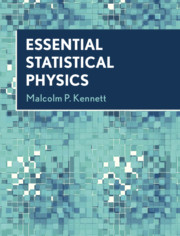Refine search
Actions for selected content:
3 results
3 - Gibbs Statistical Mechanics
-
- Book:
- Statistical Mechanics for Physicists and Mathematicians
- Published online:
- 28 July 2025
- Print publication:
- 14 August 2025, pp 51-110
-
- Chapter
- Export citation

Essential Statistical Physics
-
- Published online:
- 29 August 2020
- Print publication:
- 16 July 2020
-
- Textbook
- Export citation
2 - The Microcanonical Ensemble
-
- Book:
- Essential Statistical Physics
- Published online:
- 29 August 2020
- Print publication:
- 16 July 2020, pp 25-40
-
- Chapter
- Export citation
